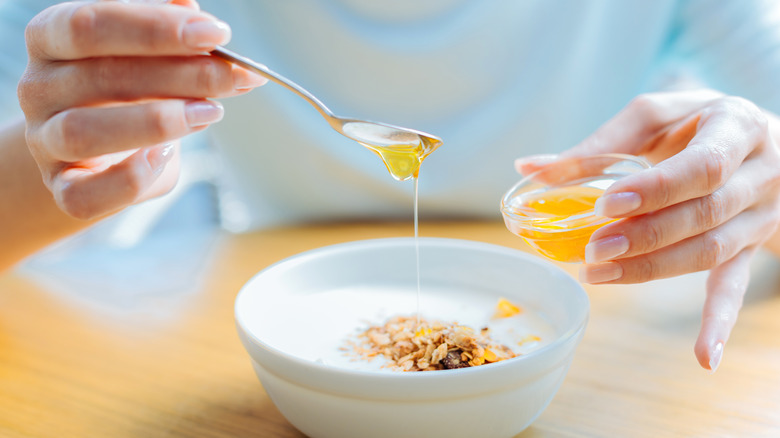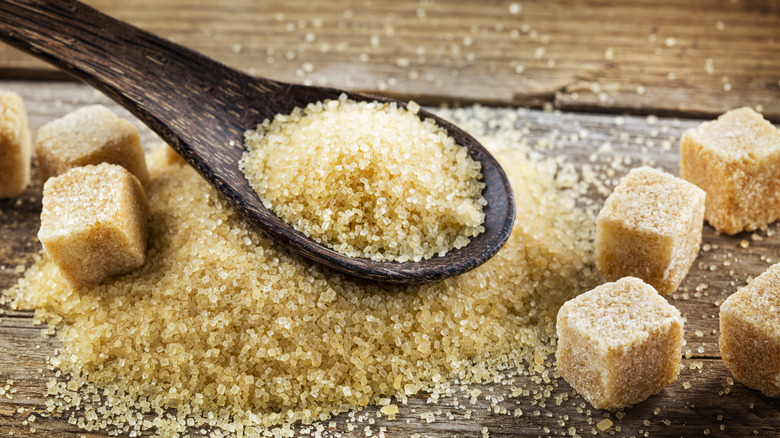Are Natural Sugars Actually Healthier Than Processed Sugars? What To Consider
The more low-carb and low-sugar diets circulate, the more you might push away the fruit plate because of the sugar content. After all, a banana has 14 grams of sugar, which is the same amount of sugar as a snack-size Hershey's milk chocolate bar. However, nutritionists tell NPR that the sugar in fruit isn't the same as the sugar in a candy bar. That's because the fruit's sugar is natural sugar.
Even though some food manufacturers might call the added sugar "natural," dieticians will consider natural sugars to be those that occur in certain foods without processing. These can include sugar in fruit, starchy vegetables, and some dairy products. Fruit and starchy vegetables have fiber to help slow down the blood sugar spike, while dairy products have a bit of protein to keep blood sugar stable (via MD Anderson Cancer Center). That's why natural sugars are healthy.
On the other hand, processed sugar isn't found in nature. Although processed sugar doesn't necessarily cause cancer, if your diet is high in sugar, it's probably low in important nutrients that can reduce your risk of cancer. Additionally, having too much sugar in your diet can eventually lead to weight gain, which is linked to cancer. Heart disease, type 2 diabetes, non-alcoholic fatty liver disease, and high blood pressure are also chronic conditions that are linked to diets high in sugar (via City of Hope Cancer Center).
'Natural' sources can still be processed
The sugar you add to your coffee typically comes from the sugar cane plant, but it must go through a process of cooking in order to extract the sweet juices. More processing will crystalize the sugar, and then the liquid is extracted. Table sugar is called sucrose, which is a glucose and fructose combo. High fructose corn syrup is a processed sugar, but so is agave nectar. It's not more "natural" than high fructose corn syrup, but its low glycemic index means it has less of an effect on your blood sugar (via City of Hope Cancer Center).
Although people might call it "natural cane sugar," table sugar is no more healthy than high fructose corn syrup, according to Harvard University. These days, you'll often see food manufacturers use names like turbinado sugar, honey, or maple syrup to sound a little healthier, but these processed sugars can shoot up your blood sugar levels all the same. That's why the American Heart Association recommends 25 grams of added sugar or less per day for women and 36 grams for men.
Food with natural sugar is healthy
According to The Conversation, the sugar in fruit is a mix of fructose, sucrose, and glucose. Fructose can be unhealthy if you consume too much of it, but it's difficult to overdo fructose with fruit. Think about it — can you really eat that many bowls of fruit?
Even though the Food and Drug Administration now requires food manufacturers to label how much added sugar is in products, this might not give you the bigger picture about how much processed sugar is in your diet. In other words, even if there is no added sugar in a glass of orange juice, the natural sugar from the oranges has been processed. Because the fiber from the orange has been extracted in the processing, orange juice can quickly raise your blood sugar. Eating an orange is more healthy for you, not only because it has less sugar than orange juice but also because it raises your blood sugar more slowly (via Harvard University).
Nutrient-rich fruit is good for your heart, brain, and gut and can reduce your risk of cancer, according to GoodRx Health. Aim for about two cups of fruit per day. If sugar is a concern on a low-carb diet, look for raspberries and strawberries, which are lower in sugar per gram than grapes and bananas.



